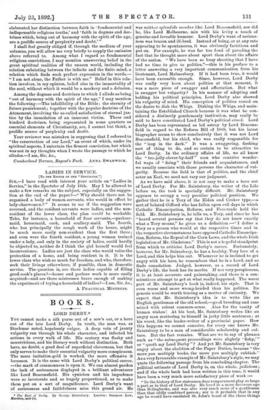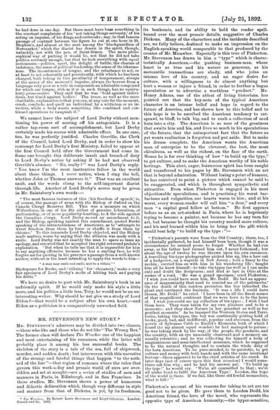BOOKS.
LORD DERBY.* You cannot make a silk purse out of a sow's ear, or a hero out of the late Lord Derby. In truth, the man was, as Stockmar noted, hopelessly vulgar. A deep vein of jaunty vulgarity ran through his whole character, and infected his actions in every walk of life. His oratory was flashy and meretricious, and his literary work without distinction. Both have, no doubt, a good deal of superficial cleverness, but that only serves to make their essential vulgarity more conspicuous. The more imitation-gold is worked, the more offensive it becomes. It is the same with Lord Derby's political career, —the mark of commonness is upon it. We can almost pardon the lack of seriousness displayed in a brilliant adventurer like Lord Beaconsfield. His cynicism and his impudence were so inveterate and so hugely proportioned, as to make them put on a sort of magnificence. Lord Derby's want of seriousness and faithfulness miss this grand air. He
• The Earl of Derby. By George Be.intsbary. London : Sampson Low, Marston, and Co. was neither splendide mendax like Lord Beaconsfield, nor did
he, like Lord Melbourne, mix with his levity a touch of genuine and loveable humour. Lord Derby's want of serious- ness was brazen and ill-bred. Instead of being, or at any rate appearing to be spontaneous, it was obviously factitious and put on. For example, he was far too fond of parading the fact that he thought more about sport than about the affairs of the nation. " We have been so busy shooting that I have had no time to give to politics,"—this is his preface to a. letter answering a very important communication from his
lieutenant, Lord Malmesbury. If it had been true, it would
have been excusable enough. Since, however, Lord Derby was really very keen about politics at that moment, it was a mere piece of swagger and affectation. But what is swagger but vulgarity ? In his manner of adopting and holding his political principles, Lord Derby also showed his vulgarity of mind. His conception of politics rested on the desire to dish the Whigs. Dishing the Whigs, and main- taining the Established Church because it was what he con- sidered a distinctly gentlemanly institution, may really be said to have constituted Lord Derby's political creed. Lord Derby has been represented as led astray by Lord Beacons- field in regard to the Reform Bill of 1868, but his latest biographer seems to show conclusively that it was not Lord Beaconsfield, but his chief, who was really responsible for the "leap in the dark." It was a swaggering, dashing sort of thing to do, and so certain to be attractive to
Lord Derby. In the ordinary affairs of life, we all know- the " too-jolly-clever-by-half " men who contrive wonder-
ful ways of " doing " their friends and acquaintances, and we usually associate with those persons the character of vul- garity. Because the field is that of politics, and the chief actor an Earl, we need not vary our judgment.
As we have said above, it is not easy to make a hero out of Lord Derby. For Mr. Saintsbury, the writer of the Life before us, the task is specially difficult. Mr. Saintsbury appears to occupy a very peculiar political position. We
gather that he is a Tory of the Eldon and Croker type,—a. sort of belated Gifford who has fallen upon evil days in which Catholic Emancipation, Reform, and Free-trade hold the field. Mr. Saintsbury is, he tells us, a Tory, and since he has "heard several persons say that they do not know exactly what a Tory means," he gives us a definition :—" I define a Tory as a person who would at the respective times and in the respective circumstances have opposed Catholic Emancipa- tion, Reform, the Repeal of the Corn Laws, and the whole Irish legislation of Mr. Gladstone." This is not a hopeful standpoint from which to criticise Lord Derby's career. Fortunately,
however, for Mr. Saintsbury, he has a healthy, Tory love of a. Lord, and this helps him out. Whenever he is inclined to get.
angry with his hero, he remembers that he is a Lord, and so finds consolation. Judged, however, as a record of Lord Derby's life, the book has its merits. If not very perspicuous, it is at least accurate and painstaking, and there is a con- scientious attempt to get at what really happened. The worst part of Mr. Saintsbury's book is, indeed, his style. That is even worse and more wrong-heided than his politics. Its genesis would be worth tracing as a matter of curiosity. We expect that Mr. Saintsbury's idea is to write like an English gentleman of the old school,—good breeding and ease mixed with robust common-sense. Alas for the vanity of human wishes ! At his best, Mr. Saintsbury writes like an angry man muttering to himself in jerky little sentences ; at his worst, like the leader-writer of a provincial paper. How this happens we cannot conceive, for every one knows Mr_ Saintsbury to be a man of considerable scholarship and cul- ture. But the fact remains. What are we to say of phrases.
such as " the subsequent proceedings were slightly fishy,' " or " quoth my Lord Derby " ? And yet Mr. Saintsbury is very angry about the abolition of the Paper Duties, because " the more you multiply books, the more you multiply rubbish.' As a very favourable example of Mr. Saintsbury's style, we may quote the following passage from his concluding chapter. The political estimate of Lord Derby is, on the whole, judicious ; and if the whole book had been written in this tone, it would.
have been a very much more satisfactory piece of work :-
" In the history of few statesmen does temperament play so large a part as in that of Lord Derby. He lived in a more decorous age than Bolingbroke, and was also very much more of a gentleman than that oddly combined person; nor is it probable that in any age he would have emulated St. John's boast of the three things. he had done in one day. But there must have boon something in the constant complaints of his not taking things seriously,' of his acting on impulse, of his flings and outbreaks ; nay, in that famous passage of contrast between the figure he cut at one hour in St. Stephen's, and almost at the next among the blackguardism of Newmarket,' which the diarist has drawn in the spirit, though, unluckily, not with the pen, of Saint-Simon. The more philo- sophical way of putting it would be, not that he did not take politics seriously enough, but that he took everything with equal seriousness—politics, sport, the delight of battle, the charms of indolence, the sense of political leadership, the sense of its irksome- ness. The incontinence of tongue, and the reluctance to act, or at least to act coherently and persistently, with which he has been charged, both belong to this peculiarity of temperament, always at the mercy of the moment's impulse, always (to borrow from a language very poor as a rule in compounds an admirable compound for which our tongue, rich as it is in such things, has no equiva- lent) prime-sautier. They said that he was bold against indivi- duals, but timid against bodies.' The truer, as well as the more charitable, explanation is that you can, at any rate for the moment, crush, conclude, and quell an individual by a witticism or an in- vective, while a body wants something like combined and con- tinued operations to vanquish it."
We cannot leave the subject of Lord Derby without men- tioning his power of scoring off his antagonists. It is a rather tap-room sort of accomplishment, but Lord Derby certainly made his scores with admirable effect. In one case, too, he was perfectly justified. Charles Greville, the Clerk
of the Council, hated Lord Derby, and in order to show his contempt for Lord Derby's first Ministry, failed to appear at the first Council held after the Government had come in. Some one brought this deliberate insult and breach of duty to Lord Derby's notice by asking if he had not observed Greville's absence. " No, really P " was Lord Derby's reply. " You know I'm the most inattentive fellow in the world about these things. I never notice, when I ring the bell,
whether John or Thomas answers it." That was an excellent snub, and the words clung to the self-important diarist through life. Another of Lord Derby's scores may be given in Mr. Saintsbury's own words :-
" The most famous instance of this [his freedom of speech] is, of course, the passage of arms with the Bishop of Oxford on the Canada Clergy Reserves Bill. This was a measure on which Wilberforce, in one of his fits either of genuine Liberalism, of partisanship, or of mere popularity-hunting, toJk the side against the Canadian c'ergy. Lord Derby moved an amendment to it, and the Bishop, speaking against this amendment, quoted Burke speaking of the intractableness of Atnericans, as to attempts to wrest freedom from them by force or shuffle it from them by chicane.' To this innuendo Lord Derby objected, and the Bishop made matters worse by saying that the allusion was made with a smile. Lord Derby was not exactly the man to spare so lame an apology, and retorted that he accepted the right reverend prelate's explanation. But when he tells me that it is impossible for him to say anything offensive because he has a smiling face, he will forgive me for quoting in his presence a passage from a well-known author, without in the least intending to apply the words to him- " A man may smile and smile, and be a villain." ' Shakspeare for Burke, and villainy ' for chicanery,' make a very fair specimen of Lord Derby's mode of hitting back and paying his debts."
We have no desire to part with Mr. Saintsbury's book in an unfriendly spirit. If he would only make his style a little more, and his politics a little less, Tory, he would not be an un- interesting writer. Why should he not give us a study of Lord Eldon P—that would be a subject after his own heart,—and Eldon as a politician is a comparatively unworked field.



































 Previous page
Previous page